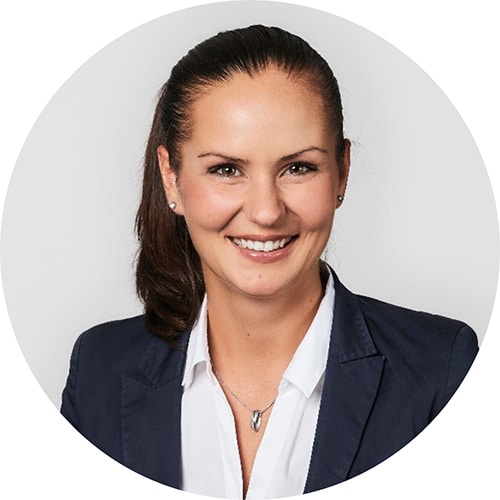How does a company become a particularly attractive employer? In an interview with FLEX Director People Jan Hauke Holste, Nadine Przyhodnik, Head of HR & Administration at the FLEX portfolio company Formware, reveals the steps her company took to be recognised as a Great Place to Work.
Hello Nadine, and congratulations on the Great Place to Work certification! Can you introduce yourself to our readers?
Nadine: Thank you, Jan, and I’m excited to share a little of our journey. I’m an authorised signatory and at the same time responsible for HR and administration at Formware. I’ve been working for Formware for around 10 years, and the award represents a lot of hard work by everyone here.
Can you tell us more about those efforts? What steps has Formware taken over the years to earn Great Place To Work certification?
Nadine: We have our headquarters in Nußdorf am Inn. In practice, that means we compete with the many companies in Munich and Rosenheim. Added to this is the general shortage of skilled workers. Against this background, we’ve made great efforts in recent years to increase our attractiveness as an employer.
We now offer a wide range of benefits, one of which is flexible working time models. These have been very well received by our employees; the 40-hour model is now actually dying out with us.
In addition, every employee now has a firm right to work from home. This option is very much appreciated, especially as everyone strives to achieve a better work-life balance.
We also offer a job bike grant. Around 30 per cent of our workforce now has a job bike that Formware has subsidised. Especially in a rural region like this, the offer of the “Job-Rad” subsidy is much appreciated. We also offer supplementary company health insurance depending on the length of service; for example, vision insurance and additional dental insurance. Thirty days of holidays per year are standard at Formware, as is a lucrative bonus system. Of course, our employees’ families are very important to us. That’s why we offer child care during the summer holidays, for example.
The company suggestion scheme is now also highly valued as a way of involving employees in questioning and changing things. Regular employee surveys, which we conduct and which are well received, are at least as important. We also put a lot of effort into the area of occupational health management. For example, every employee has a height-adjustable desk; we offer back courses—be it on-site or digitally during the pandemic—and health days, and we’re constantly working to further develop these measures.
We compete with many companies in Munich and Rosenheim. Added to this is the general shortage of skilled workers. Against this background, we’ve made great efforts in recent years to increase our attractiveness as an employer.
I think that out of the entire FLEX portfolio, you at Formware are the ones with the most mature employer-branding-employer-being concept, and you’ve seen the most benefits in terms of not only quality, but also quantity. Have you noticed that these measures have an impact on corporate culture or your return on investment?
Nadine: I can confidently say that the benefits have significantly improved the overall work atmosphere. Employees tell us on a regular basis, be it in conversations at the coffee machine or through official surveys, that they appreciate the work we’ve put in.
In the area of recruiting, we noticed that our colleagues are proud of the company and its culture and therefore recommend us to others. For example, they mention our vacancies when an acquaintance is looking for a job. We’ve clearly felt this trend in the last one or two years.
Of course, the impact of our measures can also be measured by hard and fast key figures. For example, we have very low fluctuation and a low rate of illness. In addition, we at Formware have an above-average length of service. Our managers have been with us for an average of 15 years, and for the rest of our colleagues we have an average length of service of eleven to twelve years, which is really very long. Especially since nowadays it can be assumed that, as a rule, people change jobs every five years.
In your opinion, how has the working atmosphere changed as a result of working with FLEX? I imagine many employees initially thought, Here comes the big, bad investor; they’ll take away all our benefits.
Nadine: Of course, the news about the collaboration came as a bit of a shock at first. A good year has now passed and I would definitely describe the co-operation as a gain. Through FLEX, we have a wide range of experts at our side, who bring a wealth of knowledge and experience. By gaining insight into how the other portfolio companies do things, we can think outside the box more.
Of course, the impact of our measures can also be measured by hard and fast key figures. For example, we have very low fluctuation and a low rate of illness. In addition, we at Formware have an above-average length of service.
That’s nice to hear. What are your future plans at Formware?
Nadine: We’re currently in the process of intensively analysing the results of the award. Along with the certification, we received an overview and rating scale that form a good benchmark for comparison with other companies. We’re also developing a catalogue of measures that will be presented to all employees at the next staff meeting. Basically, the results of the evaluation are very good, even better than we expected. Nevertheless, we know that there are always ways we can develop further. In the near future, our efforts will be focused on further management training and communication.
There are currently many types of these surveys. The Great Place to Work award measures the status and quality of the corporate culture, with a particular focus on topics such as leadership, communication and benefits. In this respect, the result reflects the employer’s branding. Which results surprised you in the survey because they were right at the top?
Nadine: The flexible working time models were mentioned most frequently. This topic is also in high demand in job interviews. This was followed directly by the home office option. For us, these are the two most important benefits, which are actually indispensable. Since we in the software field are often on the road, and many computer scientists work for us, one can now almost say that people insist on working from home. If we exclude the home office option, we are no longer competitive as an employer.
Does that mean the hybrid future has already found its way to you?
Nadine: Definitely, and it’s impossible to imagine life without it.
Nadine, thank you very much for the exciting insights on employee benefits and being a Great Place to Work.
Nadine: Thank you very much for the interview.













